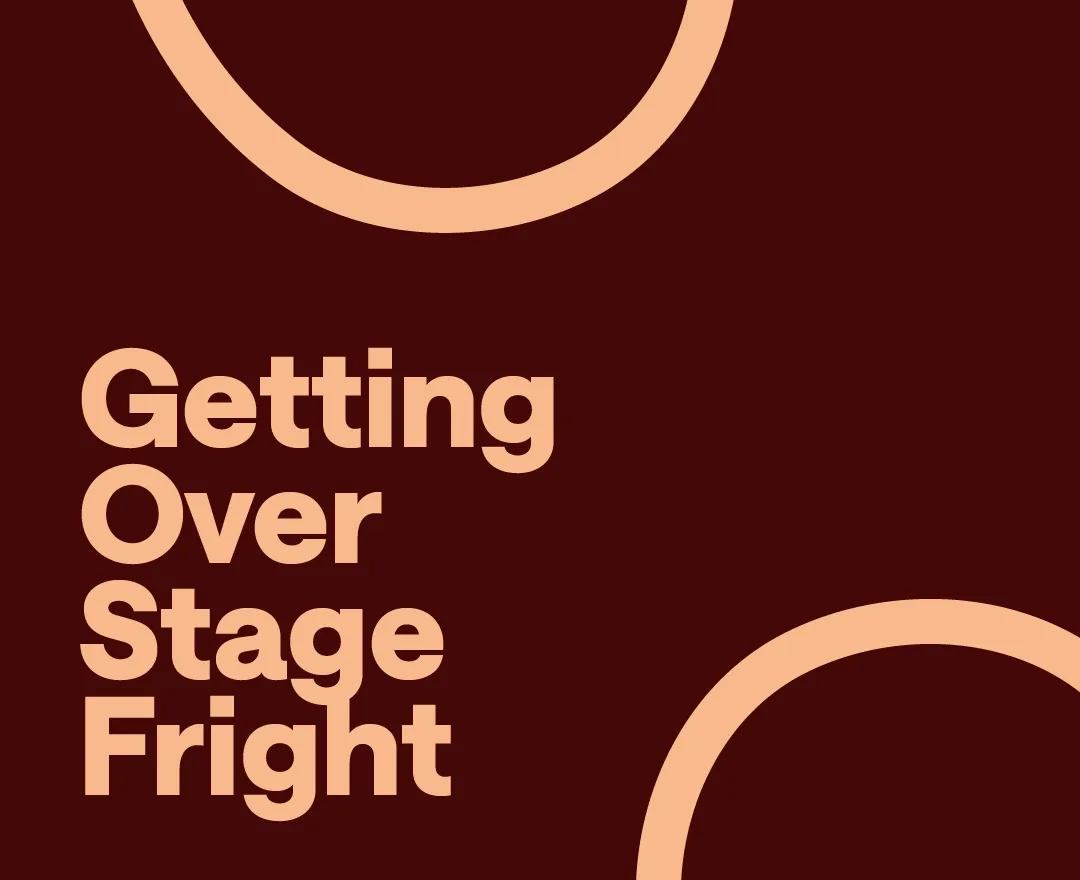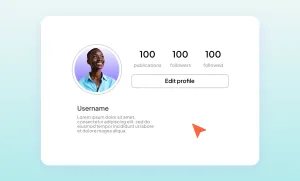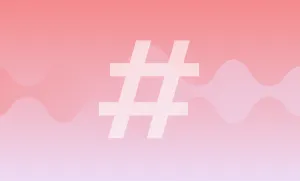Do you ever feel like the "post" button on social media is taunting you? You're not alone! Many people experience a case of the jitters when it comes to sharing their thoughts, photos, or videos online. The fear of being judged, getting trolled in the comments, or not racking up enough likes can be real. For some, this social media anxiety is so intense that it makes them want to throw their phone out the window instead of posting.
If you find yourself hesitating to hit the "post" button, this article is for you. Let's dive straight into how you can overcome social media anxiety, and why social media might give you anxiety.
Table of Contents:
1) How to overcome stage fright and post on social media
2) Social media and anxiety
3) Why does social media cause anxiety?
4) Using Podcastle to post anonymously
How to overcome stage fright and post on social media
Here are some tips on how to reduce your social media anxiety:
1) Start with anonymous posting
Start with anonymous posting to ease your way into sharing content online. This will allow you to express yourself without the fear of being judged by people who know you.
For those who want to use Instagram, YouTube, or TikTok but are anxious about putting their real voice out there, using voice skins and cloning tools can be an appropriate solution. And with tools like Podcastle, you can also modify the sound of your voice, adding an extra layer of anonymity and helping you feel more comfortable sharing your thoughts and ideas.
If you want to go fully anonymous, our free text-to-speech (TTS) will help you create content with 30+ different voices for you to choose from:
But if you feel comfortable putting your voice out there, just not your face, you can use our voice cloning tool to speak for you at all times:
2) Focus on positive feedback
Shift your attention to positive feedback and interactions. When you receive encouraging comments or likes, take note of them and remind yourself of the support you have. Creating a positive feedback loop can help reduce anxiety over time. Engage more with people who uplift you and appreciate your content. This focus on positivity can gradually diminish the impact of negative comments and increase your confidence in posting regularly.
3) Limit your exposure
Control your social media exposure to manage anxiety better. Set specific times for checking and posting on social media rather than being constantly online. This can prevent you from becoming overwhelmed by negative comments or constant comparisons. Limiting your exposure helps you maintain a healthier balance between online and offline life, reducing the pressure to always be present and active on social media platforms.
4) Start small and gradual
Begin with small, less intimidating posts and gradually increase the complexity and frequency of your content. Start with simple updates or sharing content that is less personal, and as you gain confidence, move on to more detailed posts. This gradual approach helps you build comfort and confidence in your online presence, making it easier to manage anxiety over time.
5) Change your perspective
Changing your perspective can be a powerful way to overcome stage fright on social media. Instead of viewing posts as opportunities for judgment, see them as chances for connection and self-expression. Remember that everyone has their own unique experiences and viewpoints. Embrace the idea that your voice is valuable and worth sharing. Focusing on the positive impact you can make on others can help reduce the fear of negative feedback and encourage you to post more confidently.
6) Let go of approval-seeking
Adopting a mindset where you care less about what others think can significantly reduce social media anxiety. Understand that not everyone will agree with or like your content, and that's okay. What matters most is that you are true to yourself and your interests. Practice self-acceptance and remind yourself that your worth is not determined by social media approval. By focusing on your own happiness and satisfaction, you'll find it easier to share content without the fear of judgment.
Social media and anxiety
Social media has become a big part of our daily lives. And for some, there's a real sense of anxiety that comes with sharing content, engaging with others, or maintaining an online presence on social media platforms. But how does it differ from other forms of anxiety, like social anxiety and stage fright? Let's break it down.
What is social anxiety?
Social anxiety affects approximately 12.1% of U.S. adults at some point in their lives. If you've got social anxiety, you might feel like everyone's eyes are on you, judging your every move, all the time.
Some telltale signs of social anxiety include:
– A crippling fear of being judged
– Avoiding social situations due to excessive fear or anxiety
– Feeling intense anxiety when you can't escape social situations
– Fear or anxiety that doesn’t match the possible threat of the situation
– Major distress or impairment in work, social life, and cognitive areas
Both social anxiety and social media anxiety stem from the fear of being judged and the desire to make a good impression. Social anxiety can make you nervous about interacting with people in real life, and social media anxiety can make you hesitant to share your thoughts and experiences online.
It's worth noting that social anxiety can be a serious issue. In extreme cases, it can be diagnosed as a clinical anxiety disorder, which may require professional treatment. However, it's also important to remember that everyone experiences some level of social anxiety throughout their lives. Whether it's the first day of school, a job interview, or a first date, we've all felt those butterflies in our stomachs and the desire to run and hide.
What is stage fright?
Stage fright, also known as performance anxiety, is the fear or nervousness that arises when you are about to perform in front of an audience. Maybe it's giving a speech, playing an instrument, or any situation where all eyes are on you. The fear of being judged or messing up can make you sweat, shake, and feel like your heart is about to leap out of your chest.
Stage fright and social media anxiety are similar because both involve the fear of being judged and the pressure of being in the spotlight. Just as stage fright makes you nervous about performing in front of an audience, social media anxiety makes you anxious about sharing your thoughts and experiences with your followers.
But depending on the type of content you're filming, stage fright can be a big part of content creation. For instance, if you're filming or recording in public, chances are you might feel self-conscious or nervous about being watched by others. And if it's your first time, it's completely natural to worry about making mistakes or appearing awkward on camera, especially when you're not used to being in the spotlight.
Why Does Social Media Cause Anxiety?
1) Fear of being judged
The underlying causes of stage fright on social media often come from deep-rooted fears and insecurities. For example, if you're anxious about posting on social media, the real issue might be the fear of being judged or not being accepted by your peers. The thought of your friends or relatives seeing your post and not approving can be daunting, leading to anxiety.
2) Impact of negative comments
Negative comments can be particularly hurtful because they can feel like a personal attack. This can trigger feelings of inadequacy and self-doubt, making you question your worth and abilities. The anonymity of the internet often gives power and boldness to people to say things they might not say face-to-face, making the fear of negative feedback even stronger.
3) Constant comparison
The constant comparison to others on social media can make you feel like you're not good enough. When you see others seemingly living perfect lives, it can create unrealistic expectations and a sense of inadequacy. This can lead to a cycle of negative self-talk and increased anxiety as you strive to meet those unrealistic standards. Especially if you’re also trying to create content, the comparison hits even harder. Not only do you start thinking that you’re not good enough, you also start thinking that you don’t work on your content hard enough.
4) Pressure to maintain an image
The pressure to maintain a certain image and stay relevant can also be overwhelming. Social media often rewards those who are always active and engaging, which can create a sense of obligation to keep up. This pressure can be exhausting and contribute to feelings of anxiety and burnout.
5) Fear of missing out (FOMO)
Finally, the fear of missing out (FOMO) can make you feel like you're not living your life to the fullest. Seeing others enjoying themselves or achieving things can make you feel like you're falling behind, leading to increased stress and anxiety. This fear can drive you to constantly check social media, creating a cycle of anxiety and dependence on these platforms.
Using Podcastle to post on social media
Podcastle is an AI-powered platform that helps you at every stage of the content creation process, from recording, to editing, to publishing. If you're looking to create content anonymously, Podcastle can help you:
– Automatically transcribe audio to text, then share your content on social media
– Convert text to speech with our powerful AI voice generator
– Create a clone of your voice that's readily available for you with our Revoice tool
Not only do these features help you stay anonymous, but they're amazing for whenever you're trying to repurpose content across social media platforms!








